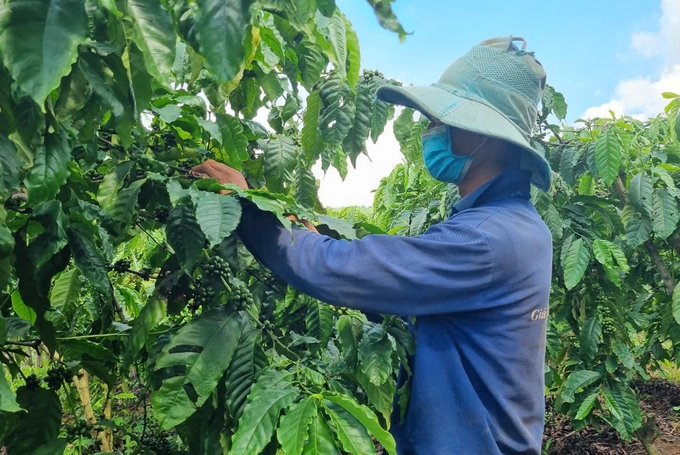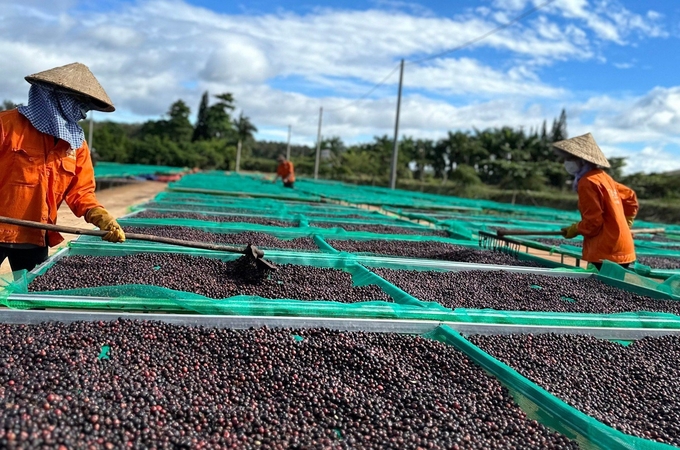May 19, 2025 | 21:15 GMT +7
May 19, 2025 | 21:15 GMT +7
Hotline: 0913.378.918
May 19, 2025 | 21:15 GMT +7
Hotline: 0913.378.918

Coffee is the main crop of Gia Lai province. Photo: Tuan Anh.
Coffee is the main crop of Gia Lai province, with an area of over 105,000 hectares spread across 10 districts and cities. Nearly 60,000 hectares of coffee are produced according to standards such as VietGAP, 4C, RA, FLO, C.A.F.E. Practices, and Organic.
The primary coffee variety grown in Gia Lai is Robusta, with a yield of over 3.9 tons per hectare and an annual production of more than 400,000 tons. Coffee from Gia Lai has been exported to 60 countries worldwide. In 2023, the export value of coffee from Gia Lai reached over 490 million USD, primarily green coffee beans.
According to the agricultural restructuring plan of Gia Lai province until 2030, the goal is to stabilize the coffee area at around 100,000 hectares, with organically produced coffee making up about 15%.
To achieve this, Gia Lai is promoting the development of coffee cultivation areas landscape-oriented, focusing on locations with favorable conditions, and integrating coffee cultivation with cultural, tourism, and service development. At the same time, the province is reviewing coffee areas that are unsuitable and have low yields, especially in water-scarce regions, to convert them to other crops with higher economic value.
In particular, Gia Lai will prioritize the replanting of aging coffee gardens, using 100% high-yield, quality coffee varieties that are resistant to pests and diseases. The province will implement intercropping with industrial crops and perennial fruit trees in areas suitable for replanting coffee.
Additionally, the province will continue to effectively execute the plan for developing Vietnam's specialty coffee. By 2030, the province aims for the area of specialty Robusta coffee to reach over 2,340 hectares, with a production target of 1,700 tons.
To ensure coffee quality, in recent years, enterprises, cooperatives, and local residents have actively applied water-saving irrigation techniques, planted windbreak trees, used mulch, and cultivated landscape coffee. At the same time, they are gradually mechanizing the harvesting process and achieving coffee production certifications.
With these sustainable approaches, Gia Lai aims that by 2030, over 80% of coffee areas will meet production standards (VietGAP, 4C, RA, FLO, C.A.F.E. Practices, Organic...) and over 70% of coffee areas will have registered cultivation codes for traceability. The province is also committed to effectively implementing EUDR regulations regarding the coffee industry to combat deforestation and forest degradation.

Gia Lai is intensifying the deep processing of coffee. Photo: Tuan Anh.
In the coming years, Gia Lai will also focus on attracting investment in the deep processing of coffee products and developing the logistics system. To achieve this goal, the local authorities will support residents and cooperatives in ensuring that 80-90% of harvested coffee is picked at the right ripeness and meets quality standards. Coffee beans must be kept clean throughout all stages from harvesting, drying, preliminary processing, and storage, to supplying raw coffee to enhance the quality of coffee for export and domestic consumption.
Additionally, there will be increased investment in upgrading drying yards and drying machines for coffee processing using dry methods. Farmers will be encouraged to cooperate in coffee processing to ensure the supply of quality raw materials for subsequent processing stages.
Gia Lai is also promoting new investments and upgrading factories using modern technology in roasted and instant coffee processing. By 2030, the goal is for deep-processed coffee production to account for 20-25% of the total coffee output of the province.
Translated by Mai Quang Huy

(VAN) 14 out of 35 domesticated elephants in Dak Lak province have had their living conditions improved, with 11 of them currently participating in the non-riding elephant tourism model.

(VAN) Muong Nhe Nature Reserve hopes that being upgraded to a national park will lay the foundation for forest protection efforts to be carried out in a systematic, modern, and sustainable manner.
/2025/05/16/3923-2-171845_52.jpg)
(VAN) Lower costs, higher yields, and improved soil quality are outstanding benefits that soybeans bring when integrated into the crop rotation system.

(VAN) The 'For a Green National Environment' programme aims to promote a green lifestyle, support businesses in implementing ESG practices, and turn Net Zero commitments into concrete actions.

(VAN) Cold-barn systems efficiently manage environmental and temperature conditions, which aids in the prevention of respiratory diseases in pigs and protects them from the vectors that transmit African swine fevers.

(VAN) To tackle challenges, the project 'Addressing key technical bottlenecks in the grouper supply chain in Vietnam' has been underway since 2024.

(VAN) The project 'Disease-Resilient and Sustainable Cassava Production Systems in the Mekong Region', funded by the Australian Center for International Agricultural Research (ACIAR), is being implemented from 2024 to 2028.